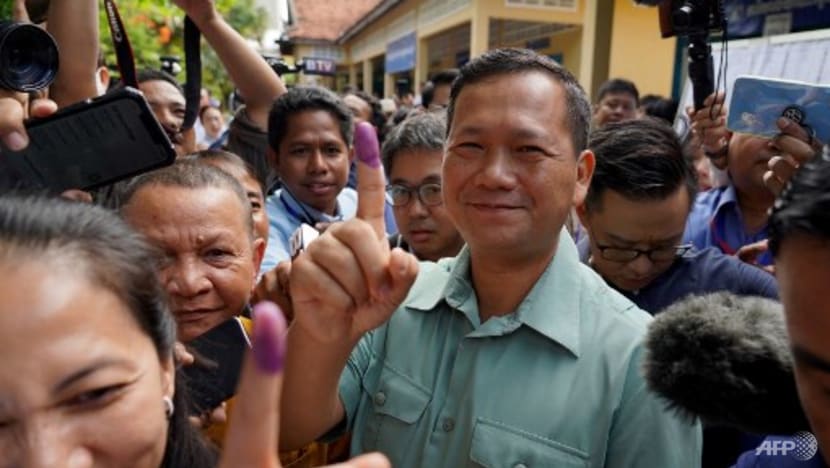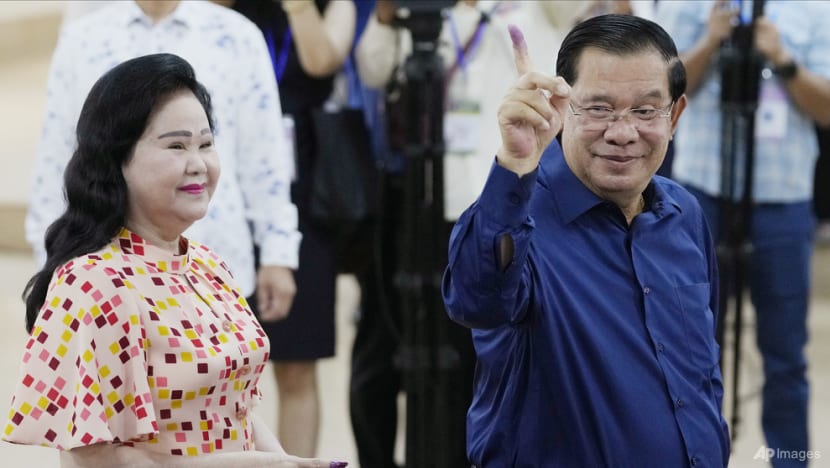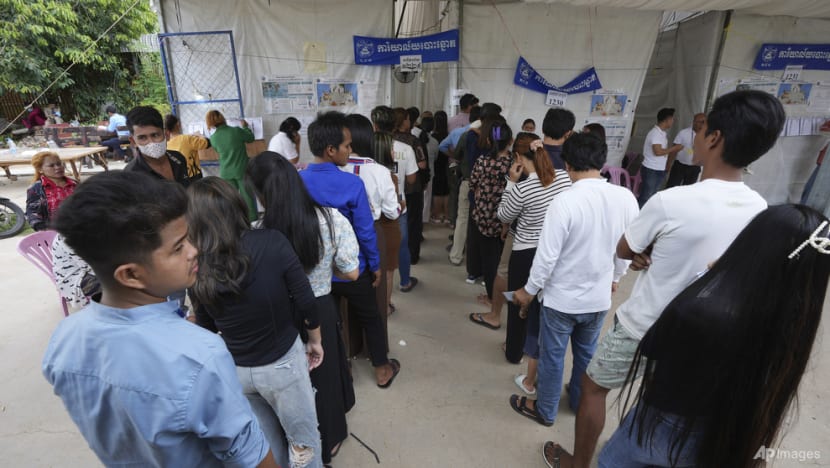Cambodia's Hun Manet: The chosen successor to Asia's longest-serving prime minister
Who is Hun Manet, how will he govern Cambodia and will his father Hun Sen fade into the background after relinquishing power? Here's what we know so far.

SINGAPORE: The ruling Cambodian People's Party (CPP) declared a landslide victory in a one-sided election on Sunday (Jul 23), clearing the path for a historic leadership transition and the end of the reign of one of the world's longest-serving prime ministers.
The seventh election since the United Nations first sponsored polls in 1993 was effectively a one-horse race, with Prime Minister Hun Sen's CPP, a political behemoth with a vast war chest, facing no viable opponent after a ruthless, years-long crackdown that has seen hundreds of its rivals flee into exile.
The CPP was leading in ballot counting late on Sunday, with a turnout of 84 per cent, according to the election committee, with 8.1 million people voting in a lopsided contest between the CPP and 17 mostly obscure parties.
Self-styled strongman Hun Sen, who has ruled Cambodia for 38 years, had brushed off Western concerns about the election's credibility, determined to prevent any obstacle in his carefully calibrated transition to his anointed successor and eldest son, Hun Manet.
No time frame had been given for the handover until last Thursday, when Hun Sen, 70, signalled that Western-educated Hun Manet "could be" prime minister next month.
A National Assembly seat would make him eligible, if backed by the house. Party spokesperson Sok Eysan said it was "very clear" that Hun Manet had won a seat.
Hun Manet, however, has given no clues over his vision for Cambodia and its 16 million people.
So who is the military general, and will his father fade into the background after the leadership transition?
Here is what we know so far.
Who is Hun Manet and how will he govern Cambodia?
Hun Manet, 45, made his debut in Sunday's election and needed to win a legislative seat to be eligible for the role of prime minister.
The election gave him an opportunity to earn legitimacy with the public and he had been expected to take over sometime during the five-year term, with his father retaining influence by becoming CPP chief in the interim.
A graduate of the West Point military academy in the United States, Hun Manet has risen quickly through the ranks of Cambodia's armed forces and has served as head of counterterrorism, deputy chief of his father's bodyguard unit, army chief and deputy military commander.
Hun Manet is also highly educated, with a master's degree from New York University and a doctorate from Britain's Bristol University, both in economics, in stark contrast to his father, who has no formal education.
He has kept a low international profile and has rarely given interviews, although he posts frequently on Facebook and Telegram like his father.
Speaking briefly to the media after casting his vote on Sunday, Hun Manet said: "Sorry. I just come to vote, not make any statement. Sorry, no comment. Thank you."
The transition will be closely watched abroad to see whether Hun Manet's experiences with British and American education and democracy will lead to a shift in the status quo and improve Cambodia's testy relationship with the West.
"A Cambodia led by Hun Manet might very well be a stronger US ally, but the US-Cambodia relationship can only thrive if it is built on strong fundamentals of common benefit and mutual respect," said John Bradford, a senior fellow at the S Rajaratnam School of International Studies in Singapore.
"US diplomats should focus on these things."
At the top of Washington’s concerns is China's involvement in construction at Cambodia's Ream Naval Base, which could give Beijing a strategically important military outpost on the Gulf of Thailand.
Ground was broken last year on the Ream project, and satellite imagery of the ongoing construction from Planet Labs PBC taken about a month ago and analysed by the Associated Press shows a jetty now large enough to accommodate a naval destroyer, if the water is deep enough.
Regionally, the Association of Southeast Asian Nations (ASEAN), which Cambodia chaired last year, has criticised Phnom Penh for undermining its unity in disputes with China over South China Sea territorial claims.
Hun Manet becoming prime minister might not bring about any change at all, however, said Bradford, who noted that educational and personal background do not necessarily translate into leadership style or political stance.
"We have a dictator in North Korea who went to school in Switzerland," he said. "His choices don't exactly reflect Swiss values."
Ou Virak, president of Phnom Penh's Future Forum think-tank, said that while "generational change" to Cambodia's leadership could begin a "honeymoon period" for international diplomacy, people will be disappointed if they expect a sharp pivot away from China.
"China is still Cambodia's main backer, Cambodia's main superpower partner," he said.
"So I think any shift to the West will be limited, because you can't alienate your main supporter."
Related:
Does the CPP have any support?
The CPP's ability to maintain peace, growth and stability after the 1970s Khmer Rouge genocide and ensuing civil war remains its biggest selling point, particularly in rural areas where many Cambodians have witnessed a relative transformation in what was once among the world's poorest countries.
Under Hun Sen, Cambodia has achieved lower middle-income status, with improvements in health, education and infrastructure.
Its textiles manufacturing sector, mainly for famous Western brands, has boomed, creating vital jobs, while the economy grew on average 7.7 per cent annually between 1998 and 2019.
On the final day of campaigning last Friday, about 60,000 CPP supporters packed a central square in Phnom Penh before daybreak to hear Hun Manet speak.
With a warm smile and soft tone, a stark contrast to his father's stern look and military-like cadence, Hun Manet said that the CPP had brought peace, stability and progress to the Cambodian people.
"Voting for the Cambodian People's Party is voting for yourselves," he told the cheering crowd, promising to return Cambodia's national pride to a "greater level than the glorious Angkor era" of the Khmer Empire, centuries ago.
There was a palpable sense of excitement as Hun Manet walked through the crowd shaking hands and taking selfies before taking a position next to his wife in the back of a pickup truck for a long parade through the city.
Sixteen-year-old Sin Dina, one of many young people who turned out, jumped up and down and waved the Cambodian flag as Hun Manet drove slowly by. She said that it was the first time she had the opportunity to see him in person.
"He looks like a gentleman, down to earth, approachable, and he's well-educated," she said, adding she only regretted that she was too young to vote. "He's an appropriate successor to his father."
Many others in the crowd also spoke of Hun Manet's education.
What has defined Hun Sen's career?
Hun Sen joined the Khmer Rouge at the age of 18 as it fought to seize power, losing his left eye in the final battle for Phnom Penh in 1975.
When a series of purges within the genocidal communist regime, blamed for the deaths of about 1.7 million Cambodians, put his own life at risk, he fled to neighbouring Vietnam, returning to help oust his former comrades in 1979 alongside an invading Vietnamese army.
By his late 20s, he was installed as foreign minister by occupying Vietnamese forces, and in 1985 he became prime minister, the world's youngest at the time.
Over the decades, he tightened his grip on power while ushering in a free-market economy and helping to bring an end to three decades of civil war.
Ly Chanthy, who braved a steady downpour to watch Hun Manet's parade through the capital last Friday, said that she remembered the Khmer Rouge days and would be forever grateful to Hun Sen, and was happy to back his son.
"I will vote for the Cambodian People's Party until I die," said the 58-year-old, a Cambodian flag on a makeshift pole over her shoulder.
"I will never forget that he rescued our lives from the Pol Pot regime."
While Cambodia is expected to attain middle-income status by 2030, according to the World Bank, the gap between the rich and poor has greatly widened, deforestation has spread at an alarming rate and there has been widespread land grabbing by Hun Sen's Cambodian allies and foreign investors.
As discontent strengthened opposition, the country's compliant courts dissolved the main opposition party ahead of 2018 elections, and over the past five years, the government has strongarmed any dissent while effectively pushing a message of peace and prosperity.
An element of "diehard opposition" remains, but even though a "silent majority" may want more options, most are comfortable enough in their jobs and lives that they are not motivated to demand change, said Future Forum's Ou Virak.
Hun Sen biographer Sebastian Strangio said that the defining characteristic of his career "has been his ideological and political flexibility".
"This is a leader who ruled at the head of a communist government in the 1980s, made a very rapid transition to the democratic system that the UN brought in, in the early 1990s, and since then has shown an uncanny ability to duck and weave and adjust on the fly in order to consolidate his hold on power," he said.
"He is a leader who came of age in a context of conflict in Cambodia in the 1950s and 60s and the experience of the battlefield has infused Hun Sen's approach to politics," he added.
"He's always seen it as a zero-sum game, a fight to the death, in many cases literally, with his opponents and he has not shirked from using the full force of the security state to consolidate his holds on power and eliminate potential sources of opposition."

Will Hun Sen disappear after stepping down?
Few think that Hun Sen will fade into the woodwork after relinquishing his current role, said Gordon Conochie, a research fellow at Australia's La Trobe University and author of A Tiger Rules the Mountain: Cambodia's Pursuit of Democracy, which was published this month.
Instead, he may be turning over power now because he sees the present moment as a good time to do so while still being able to maintain a large degree of control from the sidelines.
"It means that while his son is establishing his own authority as prime minister, he's still got a relatively young, healthy – physically and mentally – father behind him," Conochie said.
"The reality is that as long as Hun Sen is there, nobody's going to move against them. And Hun Sen will be the man in charge, even if his son is the prime minister."
Hun Sen himself has told voters that he will continue to exert power after leaving his post.
"Although Hun Sen won't be the prime minister, the political management will be still in the hands of Hun Sen," said the leader, who habitually refers to himself in the third person in public speeches.
He told voters at the end of June not to worry and said that he would not let his son damage the country.
"I am still the PM candidate, and my son is the future candidate," he said.

What have critics said about the election?
With the only credible challenge to the CPP barred from participating in the elections on a technicality, Cambodians were offered little choice but to vote for the ruling party again.
Arrests of several leading opposition figures in the lead-up to the vote also served to help stifle visible support for anyone but the CPP on the streets of Phnom Penh.
"Authorities in Cambodia have spent the past five years picking apart what's left of the rights to freedom of expression, peaceful assembly and association," Amnesty International's Montse Ferrer said last Friday.
"Many people feel that they are being forced to participate in this election despite their party of choice not being on the ballot."
Hun Sen's arch-opponent Sam Rainsy said that a key measure of public sentiment would be the number of voided ballot papers.
"Of course the ruling party will get (nearly) 100 per cent of the 'valid' ballots," Rainsy, now an opposition figurehead exiled in France, told AFP.
"The surprise of the day will be the number and the percentage of 'spoiled' ballots."
A CPP spokesman said that, as of late on Sunday, voided votes accounted for 3 per cent of votes cast.
Hun Sen ordered election laws changed last month, banning anyone who fails to vote in the poll from ever running for office – a move that will affect exiled rivals such as Sam Rainsy.
The CPP won all 125 assembly seats in the last election in 2018 and is expected to retain them.












